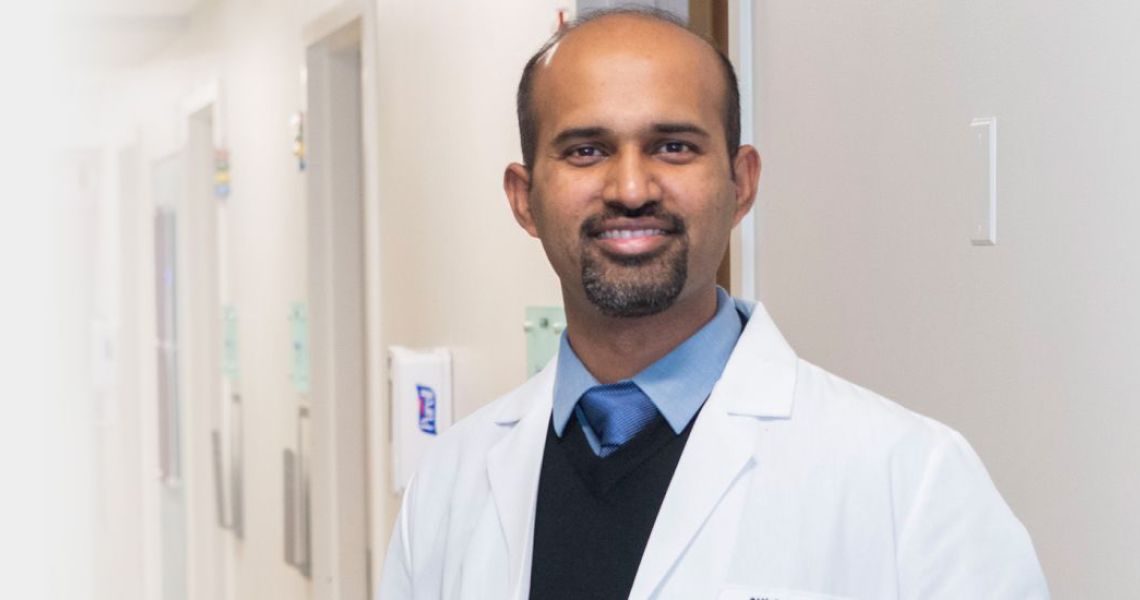Amarendra Neppalli, MD, GW Cancer Center’s Chief of Plasma Cell Disorders and Director of Transplant and Cellular Therapy is a builder at heart. Whether it’s building trust with his patients, the Cancer Center’s bone marrow transplant and cellular therapy programs, or a play structure for his young sons, he’s at his best when the plans are spread out in front of him, and he’s seeing his vision through to fruition.
What’s your story?
People who know me well – peers or family – describe me as a balanced, level-headed physician with clinical knowledge and leadership skills striving to build a bone marrow transplant program, aiming for what it can be while reinforcing what we already have.
I’m very family-focused. I enjoy spending time with my wife and seven- and nine-year-old boys. We enjoy our hobbies and doing projects together. My wife is a pediatric transplant physician. We have a strong understanding of each other’s work, which is very supportive for both of us.
What I do goes beyond the working hours — my brain is constantly rolling with thoughts about patients. And that’s where the balance comes in. It helps to step back from work and focus on the other meaningful parts of my life.
What gets you out of bed in the morning?
Making a difference. To be the person who listens to patients and hears what they’re saying. To help them through what may be the most difficult thing they’ll ever experience. To be on a team building something big and impactful.
What is that one book that has influenced you the most?
This is the easiest question. It’s The Emperor of All Maladies by Siddhartha Mukherjee. It’s an amazing book, going back thousands of years when cancer was first documented. It’s a narrative of how the disease and treatment have changed over many years.
I first read it during my residency, right after it was released. It had a profound influence on how I look at cancer in general and helped steer my career toward hematology-oncology. I would recommend this book not only to anyone interested in practicing medicine but also to anyone interested in learning about how the fight against cancer has evolved.
You and your work have made a difference for so many patients. Is there one patient who made a difference for you?
This is such an amazing question, to be honest. It’s hard to point to a single patient because all of them have touched me in some way, but there is one transplant patient who stands out.
He had been a patient for more than a year, so I got to know him quite well. Our relationship was built on trust and communication. He knew he could ask me very direct questions that he wouldn’t ask other providers because he trusted me.
About six months after his transplant, his cancer came back. He returned to the hospital, and I remember he looked at me and said, “Doc, is it time to open that bottle of wine I told you about?” And I said, “Yes, I think it is.”
This was his way of asking me if he would have the opportunity to save that bottle for a special occasion. Instead, he opened it with his family when he got home and sent me a picture of their celebration.
He also asked me, “Am I going home to die?”
I told him, “No, you’re not going home to die. You’re going home to live the time you have left.”
After he passed away, his spouse sent a letter saying those words had a profound impact on him. He made the most of the time he had left, giving him wonderful moments with his family that they might not have otherwise had. Like he did with opening the bottle of wine, he spent his time creating special occasions and memories with his loved ones.
Hearing that from his spouse deeply affected me. It made me a better person. As physicians, we provide more than just clinical care; there is also a critical human aspect to our role, which can be emotional and difficult, but often has the greatest impact on us as humans and caregivers. When patients ask these types of questions, they depend on us to be honest and compassionate. This patient trusted me enough to ask the question, and I’m grateful for that.
What is the most important thing we should know about your work?
It really does take a village to perform a transplant. It’s not just me – it’s the nurses, MAs, techs, and consult services like infectious disease, critical care, nephrology, ER, and infection prevention physicians. We’re all focusing on the patient and their needs. At the same time, we’re building a robust research program.
We may not always win with cancer, but we do everything we can to fight for our patients and make sure we give them the best of ourselves and the technology we have. That’s what we do.




